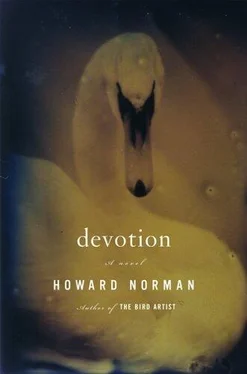The next morning broke sunny and clear. Their waitress in the hotel’s dining room said, “Weather might change momentarily, but we try to enjoy what’s given.” She put in their order.
“Quit your job, Maggie,” David said. “I know you like it. I know it’s a good job, you’ve worked hard at it, but quit it. I told the Tate I’m moving to Halifax. I gave notice. But let’s not go to Halifax. You give notice to Dalhousie. Let’s stay here.”
“And do what?”
“Not leave.”
“And after that?”
“Keep not leaving.”
They moved on to David’s book proposal (he hadn’t mentioned it all summer), then to their plans for the day, unfolding the map of Islay on the table, folding it back up when their breakfast was served. Just as they’d left a tip, they looked out the window and witnessed a kind of incident: a vintage black sedan, an ornamental silver bugle fixed to its hood, passed by on the road in front of the hotel. An elderly woman, black hair cut to just below her ears, her somber attention aimed straight ahead, was behind the wheel. A live swan was in the back seat, also facing forward. The waitress, come to fetch her tip and clear the table, saw this too. “Oh, that’s Mrs. Robert Campbell,” she said. “That swan’s got clipped wings. Mrs. Campbell found it injured near her house and nursed it back to health. She’s devoted to it beyond the logical, and why? Because she thinks the swan’s her dear departed husband. What’s the harm, I say. And besides, when Mrs. Campbell looks at that swan, who’s to tell her Mr. Campbell shouldn’t come to mind? Who’s to judge?”
David said, “We should all be so lucky,” clearly surprised at himself, as if he’d stated a belief in the afterlife he didn’t know he held. He looked at Maggie, who said, “Now that’s a topic of conversation, isn’t it? For later, darling.” The waitress went to another table.
Such an odd sight might have conveniently convinced a tourist of the general notion of Scottish eccentricity, or in this case, eccentricity on Islay in particular. But for all David and Maggie knew, the waitress considered the sight of Mrs. Campbell chauffeuring her swan-husband as merely familiar.
“Well, my part of Nova Scotia’s got its share of people equally fixed in their beliefs, of this and that sort,” Maggie said.
“You’re not homesick, are you?” David said.
“Not in the least. Not here. Not now.”
After breakfast they called on the Tecoskys again, inviting them out for a walk. They’d strolled along the cliffs for only ten minutes or so when Isador got winded and began coughing. They returned to the house. “Some days are easier than others,” he said. “What can I tell you?”
“You live in a beautiful place,” David said. “Your house is the most comfortable I’ve ever been in in my life. I mean that.”
In their kitchen Isador presented them with a pair of binoculars. “May we suggest your going to look at swans,” Stefania said. “They’re called whooper swans, and they arrived early this year. You can see them at Loch Gorm. Please use our car. We aren’t driving anywhere all week.”
They visited the Round Church in Bowmore, built in 1767, one of two round churches in Scotland. The medieval ruined chapel and grave slabs at Finlaggan. The old Islay lifeboat station at Port Askaig. They drove all over the island. Lochs and harbor villages. But every day, too, they stopped at a different beach. The one at Lossit, at Kilchiaran, Saligo, Tayvulin, Aros, Traigh Bhan, Big Strand; much of their time made for a kind of gazetteer of beaches; the sea set up its lull and roar in their ears. Their map of Islay was creased, frayed, marked up with directions, blotched with tea stains.
They reluctantly left Islay on August 18, this time flying from Glendale to Glasgow, then to London, arriving at Durrants Hotel at 1 A.M. Since Maggie’s flight to Amsterdam (with connecting flights to Montreal and Halifax) was at 7 A.M., they decided to stay up all night, which they did. Then David drove Maggie to Heathrow.
David went back to the hotel. He slept till noon, waking because the telephone rang. It was William. He was in the lobby. David joined him for lunch in the dining room. William spoke excitedly about his appointment with Mr. Aston, asked after Stefania and Isador, of course asked after Maggie, and finally said he intended that afternoon to visit the Tower of London, then make an early night of it. David noticed that when William got worked up in his enthusiasms, his Scottish accent intensified. He also noted that William pointedly did not ask how “they” enjoyed their honeymoon — he’d phrased it, “And how’d Maggie like things on Islay?” He’s getting used to the idea of us being married, David thought. Nothing unusual there. On the other hand, William thought, Look at this, he lets me rattle on — politeness for the old father-in-law — he’ll learn how to speak up for himself with me — then it’ll be a real conversation — things take time. David picked up the tab without need of insistence. “Not much to spend your money on on Islay, is there?” William said.
“See you soon in Parrsboro,” David said. They shook hands. “Then we’ll hear all about your visit with the Queen’s swankeeper.”
They took separate cabs, William to the Tower of London, David to his bank, where he transferred all but a little of his savings to a bank in Halifax. He ran a few other errands. By the time he got back to Durrants Hotel, it was 5:45. The instant his cab stopped in front of the hotel, he saw Katrine Novak entering the lobby. He was incredulous: although he might better have thought, Don’t go into the hotel, he actually thought, We should never have left Islay. Neither was quite useful enough. He paid the cabbie and went into the lobby, where Katrine was inquiring after him at the registration desk.
“Katrine,” David said. She turned and they stared at each other across the lobby. “What are you doing here?” David’s sour tone drew John Franco’s disapproving notice. David locked his arm in Katrine’s and steered her to the bar. They sat at a corner table.
Katrine was thirty-one, slim, as tall as David, with dark brown hair cut short, a beautiful complexion, cheekbones with wide-angled planes, brown eyes. An altogether striking woman. She was dressed in what David called, with dubious affection, one of her “Eastern European bohemian looks”: black jeans, buckled ankle-length boots, black cowboy shirt with silver piping. She spoke English with a noticeable but not thick accent. She was a freelance translator, mainly of mystery novels, “killer-thrillers,” as she called them, police procédurals like Ed McBain’s. Translation fees varied, and steady work didn’t necessarily mean the bills got paid on time. An acquaintance at the Tate once asked David to describe the woman he was seeing in Prague, and he said, “Beautiful and matter-of-fact.” But Katrine was more complicated than that. Like anyone is more complicated.
“I got your letter,” she said. “I take it David Kozol is married. Did your life work out this way?”
“Katrine, first, how did you find me?”
“Well—” She took a pack of cigarettes from her pocketbook, tapped one out, flicked her lighter and smoked for a moment. “You see, that question puts me in the position of humiliation. Because if I answer it honestly, I have to describe how I spent much precious time to find you, which is true. You didn’t have your telephone machine hooked up for months, right? Finally I called the gallery where you teach. Your friend there — someone, what’s his name, I forgot— said you were flying here to Canada, back and forth. Doing this a lot, he said. He said why not knock on your apartment door. I waited these months. I had my work. I accepted you wanted to end things. But then I asked myself, How do I feel dignified in this? Okay, so we were never to get married maybe. Fine and dandy, all right. However, you got to write your letter, but I don’t get to answer? I decided it’s best in person. So I called your gallery friend back. He gave me your landlord’s telephone, who I rang. And he said you just stopped in to pay some money you owed him. He said you were checked into this Durrants Hotel. Simple. I went to the airport and now I’m here.”
Читать дальше












